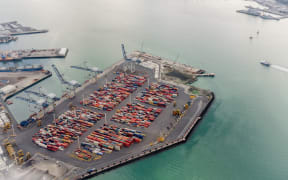The government is introducing new testing measures for border workers, including increasing the frequency for some of those at higher risk.

Minister in charge of Covid-19 Response Chris Hipkins says employers will be expected to keep records about their employees' new testing requirements and compliance. Photo: RNZ / Samuel Rillstone
Minister in charge of Covid-19 Response Chris Hipkins said the new rules would increase the safety of border workers, and further strengthen New Zealand's barriers against the virus.
"These strengthened rules - to apply to all international airports and ports - build on the mandatory testing orders we've been implementing since August and will make our border safety even stronger. They are the latest steps in the government's extensive and ongoing programme to develop and refine our Covid-19 response," he said.
The changes follow the marine employee cluster last month, which began after an engineer caught Covid-19 while working on a foreign vessel.
The new rules include:
- Increasing the frequency of testing for ship pilots and some other port workers who carry out work on affected ships, from fortnightly to weekly
- Increasing testing frequency for some workers who carry out work on aircraft that have arrived from outside of New Zealand, from fortnightly to weekly
- Mandatory fortnightly testing for port workers not already covered
- Mandatory fortnightly testing for airport airside and landside workers not already covered who interact with international arriving or transiting passengers
Hipkins said employers would be expected to keep records about their employees' testing requirements and compliance, and facilitate their testing.
"I'd like again to pay tribute to the people who work at our ports and airports and managed isolation and quarantine facilities. They are some of the real heroes of our Covid-19 response".
The latest requirements come into force from midnight on 26 November.
"There's thousands of people who interact with the ports, not all of those people are going to need to be tested regularly, some people their relation with the port is only a tangential one and they are never likely to come in contact with the virus, Hipkins told Morning Report.
"The most at-risk people are the people going onto ships, who are interacting directly with people who are coming into New Zealand from outside even if they're not staying, just passing through ... they will be tested weekly.
Hipkins said it would not put a strain on testing capacity.
"The port is an in an incredibly complex operation, understanding that, making sure the systems we're putting in place are workable - that's been a focus over the last couple of months."
Border workers were willing to be tested to assure their families and the wider community that they were producing negative results; many had even cut extracurricular activities to keep everyone safe, he said.
Hipkins asked New Zealanders to "go easy on the border workers ... we need them to keep the border open for movement of goods and essential people ... and they're being tested all of the time, they deserve our thanks".





